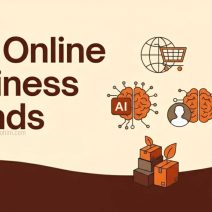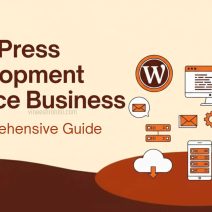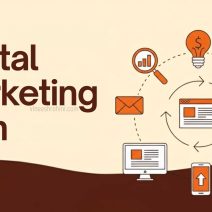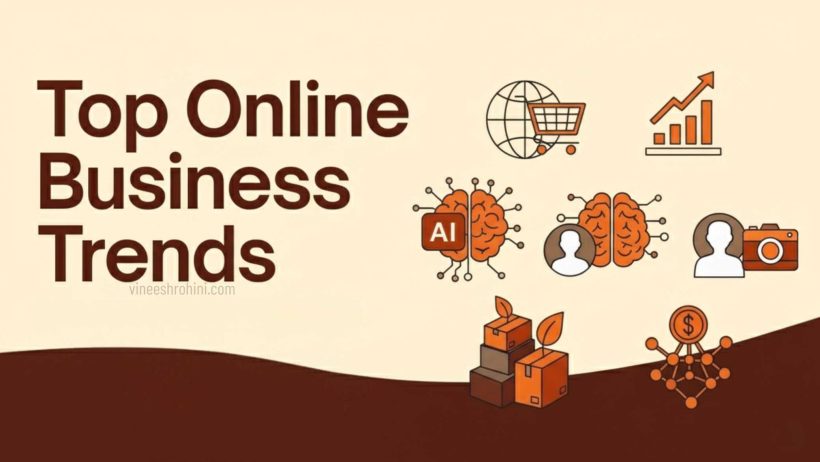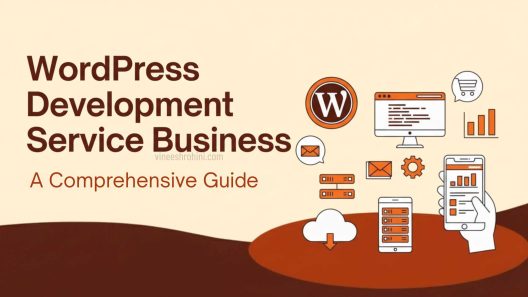Top Online Business Trends for 2025 : The world of online business in 2025 has evolved into a landscape defined by innovation, automation, and personalization. Technology is not only reshaping how businesses operate but also transforming how consumers behave, engage, and make purchase decisions. From AI-driven marketing to the rise of digital products and immersive shopping experiences, 2025 presents enormous opportunities for entrepreneurs and established companies alike.
Table of Contents
This comprehensive guide explores the top online business trends that will define success in 2025, helping you stay ahead in a rapidly changing digital world.
1. The Rise of AI and Automation in Online Business

Artificial Intelligence (AI) is no longer a futuristic concept — it is the core of modern online business operations. In 2025, AI has become indispensable for digital entrepreneurs. From automating customer interactions with intelligent chatbots to creating personalized shopping experiences and optimizing marketing campaigns, AI enhances efficiency and profitability.
Also Read : How to Manage Finances for an Online Business – Comprehensive Guide 2025
Businesses use AI to predict consumer behavior, improve product recommendations, and even generate high-performing content. Automation tools streamline repetitive tasks like inventory management, data analysis, and social media posting. The result is increased productivity and reduced operational costs.
Entrepreneurs adopting AI tools early are gaining a competitive advantage by delivering smarter, faster, and more efficient online services. AI-driven platforms such as automated customer service, dynamic pricing models, and machine learning-based analytics are transforming online businesses from reactive to proactive systems.
2. Hyper-Personalization as a Growth Engine
In 2025, personalization is the key to retaining customers and increasing conversions. Consumers now expect online businesses to recognize their preferences and deliver relevant recommendations. Hyper-personalization goes beyond using a customer’s name in an email — it involves analyzing real-time data to craft unique experiences for each visitor.
E-commerce websites now use personalization engines to recommend products based on browsing behavior, purchase history, and engagement patterns. Personalized emails, dynamic landing pages, and behavior-triggered offers are creating a deeper emotional connection between brands and their customers.
Online businesses that leverage AI-powered personalization see higher conversion rates, improved retention, and increased lifetime value per customer. The more relevant the experience, the stronger the customer loyalty.
3. Social Commerce and Creator-Driven Marketing
Social media has become a major driver of online business growth. Platforms like Insta and YT are no longer just for engagement — they are powerful sales channels. Social commerce, the process of selling products directly through social media, continues to dominate 2025.
Creators, influencers, and small businesses are launching their own digital shops through social media integrations. Livestream shopping and creator-led product launches are building real-time trust between brands and consumers. Creator commerce — where influencers sell their own branded products or collaborate with companies — is reshaping online retail.
Businesses that partner with micro-influencers are achieving authentic audience engagement and measurable sales results. The future of online business is humanized through social influence and interactive buying experiences.
4. The Growth of Subscription and Membership Models
Recurring revenue models have become a vital part of online business strategy. Subscriptions, memberships, and access-based pricing help stabilize income and deepen customer relationships.
In 2025, online businesses are offering flexible subscription options — from premium content access to digital product bundles and software memberships. Subscription models offer predictable cash flow, while customers enjoy convenience and exclusivity.
For instance, SaaS companies rely heavily on subscription billing, while content creators monetize through memberships or paid newsletters. The key to success lies in consistent value delivery and excellent customer retention practices. Businesses that introduce loyalty rewards, personalized upgrades, and community engagement features will outperform those focused solely on one-time sales.
5. The Expansion of Digital Products Market
Digital products have become the foundation of online entrepreneurship. From templates, online courses, eBooks, and design assets to productivity tools, selling digital products allows businesses to scale globally with minimal overhead.
In 2025, consumers prefer instant access and downloadable resources. Platforms that support digital commerce — like Shopify, Gumroad, and self-hosted websites — make it easier for creators to reach a worldwide audience.
The scalability, high profit margins, and automation potential of digital products make them one of the most sustainable online business models today. Entrepreneurs who combine creativity with marketing automation are turning their skills into passive income streams.
6. Sustainability and Ethical Online Business Practices

Sustainability is now a crucial business value. Consumers are increasingly choosing eco-conscious brands that emphasize transparency, ethical sourcing, and environmental responsibility.
Online businesses are adapting by offering carbon-neutral shipping, digital receipts, and minimal packaging. Sustainable web design and green hosting services are also on the rise, reflecting the growing demand for environmentally friendly operations.
Businesses that communicate their sustainability initiatives transparently are building stronger relationships with conscious consumers. In 2025, integrating social responsibility into your brand identity is not optional — it’s expected.
7. The Influence of Voice Search and Conversational Commerce
Voice search is changing how consumers discover products and services online. With the growing use of smart devices and voice assistants, optimizing for voice queries is becoming essential.
Conversational commerce — where customers interact with brands through chatbots, messaging apps, and voice interfaces — is gaining traction. Businesses can now handle inquiries, offer product recommendations, and even process payments through chat.
The key trend in 2025 is human-like interaction powered by natural language processing. Customers value convenience, and brands that provide voice-enabled or chat-based purchasing options are creating frictionless shopping experiences.
8. Augmented Reality (AR) and Immersive Shopping Experiences
Augmented Reality is revolutionizing online shopping by bringing real-world experiences into digital platforms. Shoppers can visualize furniture in their homes, try on eyewear virtually, or preview clothing before buying.
AR technology boosts confidence and reduces return rates, which is critical for e-commerce profitability. By integrating AR previews, online retailers are bridging the gap between digital and physical experiences.
As AR tools become more accessible, expect even small businesses to adopt them for interactive product showcases. Immersive experiences like virtual try-ons and 3D product views are redefining customer expectations for online retail in 2025.
9. The Shift Toward Omnichannel Marketing
Omnichannel marketing ensures that customers receive a consistent brand experience across all digital touchpoints — websites, social media, mobile apps, and email campaigns.
In 2025, successful businesses are integrating marketing automation platforms that sync data across multiple channels. When a user interacts with a brand on social media, that engagement influences what they see in personalized email campaigns and website recommendations.
The focus is on creating seamless transitions between platforms. Whether a customer starts a conversation on Insta or browses your website later, they experience continuity. This consistency enhances customer satisfaction and drives higher conversion rates.
10. The Rise of Micro-Niches and Specialized Markets
The internet’s vastness allows even small businesses to thrive by targeting micro-niches. Rather than competing with global giants, entrepreneurs in 2025 are focusing on niche-specific audiences.
Micro-niche businesses offer personalized solutions that large corporations cannot. This hyper-targeted approach builds brand loyalty and helps businesses dominate smaller but more engaged markets.
Examples include niche subscription boxes, specialized digital tools for freelancers, or wellness products catering to specific demographics. Success in 2025 lies in identifying a profitable micro-niche and serving it with unique value and expertise.
11. The Growth of Mobile-First Businesses
Mobile-first strategies are no longer optional. The majority of global online traffic comes from smartphones, and businesses that optimize their websites, apps, and content for mobile users will dominate.
In 2025, businesses are focusing on mobile UX design, lightning-fast load times, and simplified checkouts. Mobile wallets, one-tap payments, and app-based loyalty programs are enhancing convenience for shoppers.
A smooth mobile experience directly impacts conversion rates. From mobile ads to push notifications, mobile-first marketing ensures that your business stays connected with users wherever they are.
12. Blockchain Integration and Secure Digital Payments
Security and transparency are major concerns for online buyers. Blockchain technology is emerging as a solution for secure transactions, digital contracts, and decentralized marketplaces.
In 2025, blockchain-powered payment gateways, smart contracts, and tokenized loyalty systems are enhancing trust between buyers and sellers. While cryptocurrency adoption varies globally, blockchain ensures tamper-proof records and better fraud prevention.
Businesses adopting blockchain gain credibility and attract tech-savvy customers who prioritize transparency and innovation.
13. The Importance of Data Privacy and Consumer Trust
As data collection becomes more extensive, privacy is now a major differentiator. Consumers in 2025 expect brands to handle their personal information responsibly.
Online businesses must comply with global data protection standards and implement transparent policies. Building trust through data security is essential for long-term growth. Businesses that prioritize user consent and avoid intrusive marketing tactics create stronger customer relationships.
The future of marketing lies in ethical data practices and responsible personalization — balancing relevance with respect for privacy.
14. Artificial Intelligence in Digital Marketing
AI has transformed how businesses market their products. From predictive analytics and automated ad placements to chat-based sales funnels, AI enables brands to reach audiences more effectively.
In 2025, AI marketing platforms analyze customer behavior, predict buying intent, and create content tailored to each user. Dynamic ad targeting, sentiment analysis, and real-time campaign optimization are helping marketers achieve maximum ROI.
Businesses that combine human creativity with AI-driven insights are dominating the digital marketing space by delivering smarter and more persuasive campaigns.
15. Content Marketing and Storytelling Evolution
Content remains the backbone of online business success. However, in 2025, the focus has shifted toward storytelling, authenticity, and value-driven narratives.
Brands are moving away from purely promotional content and focusing on educational, engaging, and community-oriented storytelling. Blogs, podcasts, video content, and interactive media are being used to build brand trust and authority.
Search engine algorithms now prioritize quality, intent-driven content that genuinely helps users. Businesses that invest in long-form blogs, case studies, and thought leadership content gain better rankings and stronger brand visibility.
16. Affiliate Marketing and Influencer Partnerships
Affiliate marketing continues to be one of the most profitable online business trends. As online traffic diversifies across multiple platforms, affiliates play a crucial role in driving sales through authentic recommendations.
In 2025, affiliate programs are becoming more performance-based and integrated with influencer marketing. Brands are offering higher commissions, customized discount codes, and exclusive collaborations to attract quality affiliates.
By combining influencer credibility with affiliate reach, businesses can expand their visibility and drive consistent online revenue.
17. The Evolution of Remote Work and Online Service-Based Businesses
The global shift toward remote work has fueled the rise of online service businesses. Freelancing, virtual consulting, and online agency models are now mainstream business opportunities.
In 2025, entrepreneurs are building scalable online service brands that operate entirely remotely. Virtual teams collaborate across continents using project management and communication tools.
Service-based businesses such as digital marketing, web development, and business coaching are thriving due to global demand and low startup costs. The ability to serve international clients has made online service entrepreneurship more accessible than ever.
18. Customer Experience and UX Design as Key Differentiators
Customer experience is the defining factor that separates successful online businesses from the rest. In 2025, user-centric design is not a trend — it’s a requirement.
Seamless navigation, fast load times, clear product pages, and responsive support systems create trust and satisfaction. Businesses are investing heavily in UX design to ensure smooth interactions across every digital touchpoint.
Enhanced UX leads to higher conversions, better retention, and more positive reviews — all essential for sustainable online growth.
19. AI-Enhanced Analytics and Predictive Decision-Making
Data is the new currency of online business, and in 2025, predictive analytics powered by AI is helping entrepreneurs make smarter decisions.
Businesses use AI analytics to identify customer behavior patterns, forecast sales trends, and optimize pricing strategies. Predictive tools allow companies to anticipate demand and reduce risks.
The ability to convert raw data into actionable insights gives businesses a competitive edge in a data-driven digital marketplace.
20. The Future of Online Business in 2025 and Beyond
The online business ecosystem in 2025 is an intersection of technology, creativity, and customer-centric innovation. Entrepreneurs must be agile, adaptive, and data-informed to thrive.
The next phase of digital commerce will rely heavily on automation, ethical practices, and cross-platform integration. Businesses that combine AI-driven personalization, sustainability, and strong storytelling will shape the future of online entrepreneurship.
Top Online Business Trends for 2025 – Conclusion

Online business in 2025 is about efficiency, authenticity, and adaptability. Entrepreneurs must understand evolving consumer behaviors, adopt new technologies, and stay flexible to succeed. Artificial Intelligence, personalization, social commerce, and digital products are setting the tone for the future.
Buy Now : Online Jewellery Shopping Website
By focusing on innovation, data-driven marketing, and customer trust, online businesses can build long-term success. The digital marketplace will continue to expand, but only those who anticipate trends and execute them effectively will stand out.
The future belongs to those who embrace change, prioritize customer experience, and integrate technology intelligently into their online business strategies.
Disclaimer : This article is for informational and educational purposes only. The strategies, predictions, and examples discussed are based on general market insights and do not constitute professional business or financial advice. Entrepreneurs should conduct their own research or seek expert consultation before making business decisions.
Keywords : Top Online Business Trends for 2025 – Top Online Business Trends for 2025 in India
